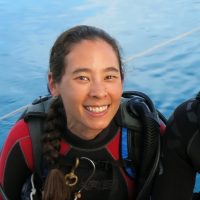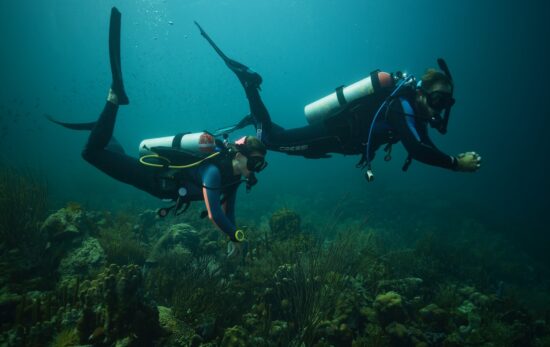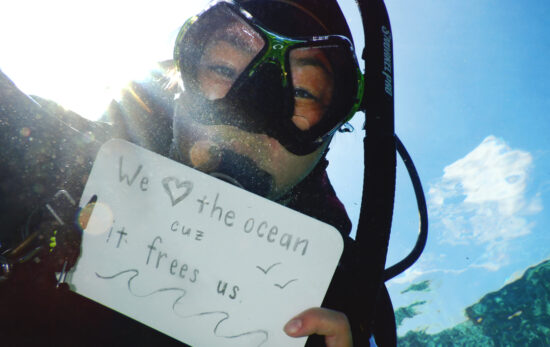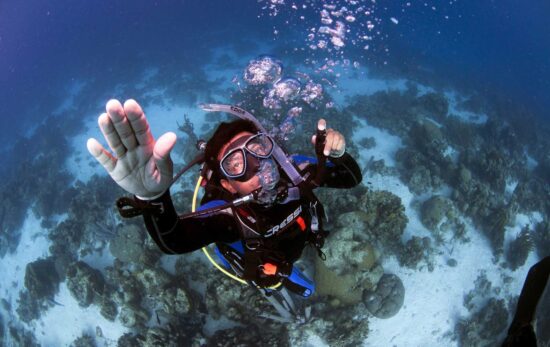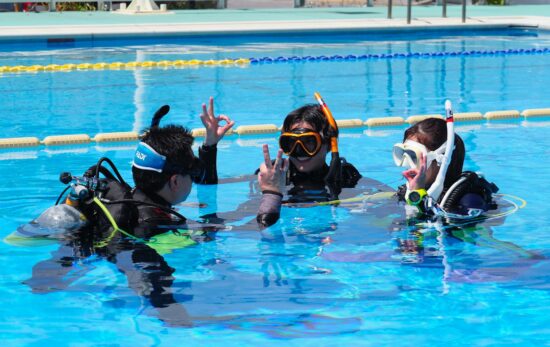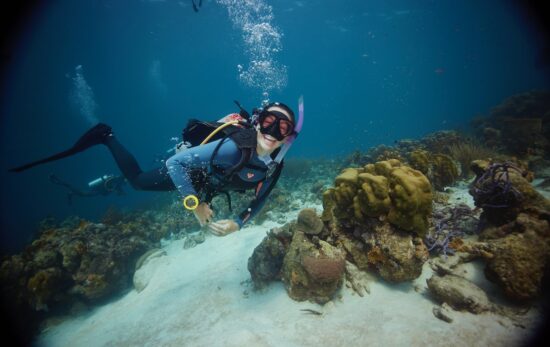When I was four years old, I told my mom I was running away from home. I filled a little red wagon with my prized possessions (mostly stuffed animals) and set out for the unknown: our driveway. My mom stood at the front door and watched me tow my wagon to the end of our carport. I took one look at the pouring rain, turned around, and came back inside.
Twenty years later, I found myself dragging a wagon piled with dive gear along the picturesque waterfront of Avalon, California. As I gazed toward our destination, the famous Casino Point dive site, my guts churned with the same mix of excitement and fear I had when I stepped off the front stoop.
Six months had passed since I finished my PADI® Open Water Diver course. I’d waited long enough (maybe too long) to make my first post-certification dive. It was time to take the training wheels off and find out if I had what it took to be a bonafide scuba diver.
The night before, I hardly slept. My mind churned with worries:
- Would I remember how to assemble my gear?
- What if I couldn’t clear my ears?
- What if one of us got the bends?
- Why didn’t I think to bring my Open Water course materials so I could review skills instead of just staring at the ceiling?
My First Dive After Certification and Lessons Learned
The next morning, we hauled our scuba gear to the dive site, ready for adventure. Unfortunately, I made the mistake of putting my wetsuit on first. In a matter of moments, I was sweating like crazy under 7mm of neoprene.
I couldn’t wait to get in the water and cool off so I rushed through my gear assembly (luckily, I remembered how everything went together). My buddy helped me put my kit on, we did a buddy check and off we went.
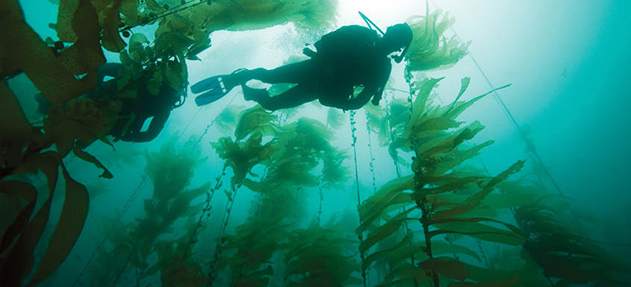
Neither of us had been in a kelp forest before, but getting tangled in kelp was the furthest thing from my mind. Why? Because all I could think about were the equalization problems I had during my open water training dives. It took ages for me to descend below 10 metres/30 feet.
The longer it took for me to descend, the more frustrated I became. Why couldn’t I just drop down like other divers? What was wrong with my stupid body? I pushed my eustachian tubes harder than I should have. Discomfort turned to outright pain and I almost didn’t finish my course. But I digress…
Okay, back to Catalina. As I stood on the entry steps, I looked out over the water and prayed to Poseidon my ear issues would dissolve the instant I stepped in the ocean.
The queue of divers behind me was getting long. It was time to do the thing: make my first dive without an instructor.
My buddy and I kicked out to the float and did a quick buoyancy check. We exchanged okay signs and signaled our descent. As I deflated my BC, I sent my eustachian tubes a mental threat, “don’t even think about ruining this dive for me!”
At 3 metres/10 feet, things were okay, but when we reached about 6 metres/18 feet my ears wouldn’t clear. I’ll spare you the (literal) ups and downs of my dive, but, long story short: I spent the entire dive at 7 metres/21 feet or shallower. It felt like a glorified snorkel.
My buddy happily swam below me, checking back frequently to make sure I was okay. I was, except for the tears filling up my mask.
Even though we had multiple tanks and could have made another dive, I was too upset and ashamed to get back in the water. Clearly, I didn’t have what it took to be a real scuba diver.
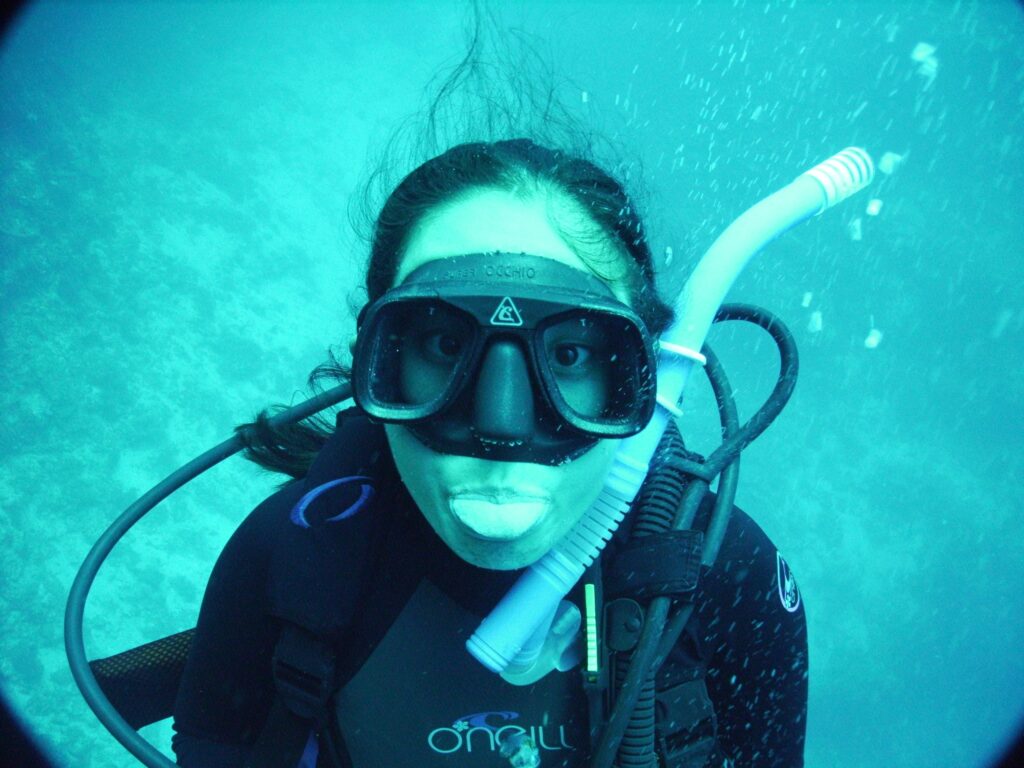
Not a Dramatic Story, but an Important One
If you were expecting a dramatic tale that ends with my lifeless body being cut from tangled kelp and a dramatic helicopter evacuation… sorry not sorry. But if you’re into that sort of thing, you can read stories about dives gone wrong on DAN’s website.
This story is for the divers who struggled in their open water class or had a crappy first dive after certification. It’s for any diver who feels stuck between wanting to like scuba diving and not actually liking scuba diving. I see you, friend.
I’m sharing this story because I almost gave up diving. I almost missed out on a lifetime of magical experiences and amazing friends I can’t imagine life without.
It took becoming a scuba instructor for me to realize: a lot of people aren’t naturally good at scuba diving. PADI training gives us the knowledge we need to dive safely, but many of us have mental and physical issues (I’m looking at you eustachian tubes) to overcome.
Does that mean scuba diving is hard? Yes and no. It’s relatively easy to learn, but takes time to master (a good instructor helps). In other words, learning to dive is like learning to shoot free throws, serve a ball, master a balancing pose in yoga, or any other skill that requires muscle memory and mental focus.
If you didn’t love your Open Water class, or feel like you’re a crappy diver, hang in there. Don’t give up and stop being so damn hard on yourself!
Since that first, miserable dive I’ve learned a lot about scuba diving and myself. Here are a few of my top tips:
Scuba Diving Tips for Beginners
5 Lessons Learned From My First Post-Certification Dive
If I could get in a time machine and do my first dive again I would have:
- Booked a Discover Local Diving experience with a PADI Professional — Because I didn’t feel confident in my skills and had never dived in that type of environment before. Not to mention: local dive professionals always know where to find the cool stuff.
- Read DAN’s Smart Guide to Ear Equalizing — Because Divers Alert Network (DAN) always has great advice.
- Reviewed my Open Water Diver student materials or enrolled in PADI ReActivate®™
- Been more patient with myself — I was spun up and anxious when what I needed to do was relax.
- Appreciated the moment — Not long after that first dive, my buddy and I moved to California and made dozens of dives in kelp forests. The diverse ecosystem means you’re surrounded by interesting marine life, even on shallow dives.
Don’t Give Up on Yourself
So how did I go from feeling like a major failure to diving all the time and becoming a scuba instructor? The answer is: I took another scuba class.
Like many divers, I incorrectly assumed Advanced Open Water is only for divers who have reached an advanced skill level. Luckily, someone explained what Advanced Open Water is actually about: working with an instructor to gain dive experience. There are no quizzes or exams and you spend the majority of the class in the water.
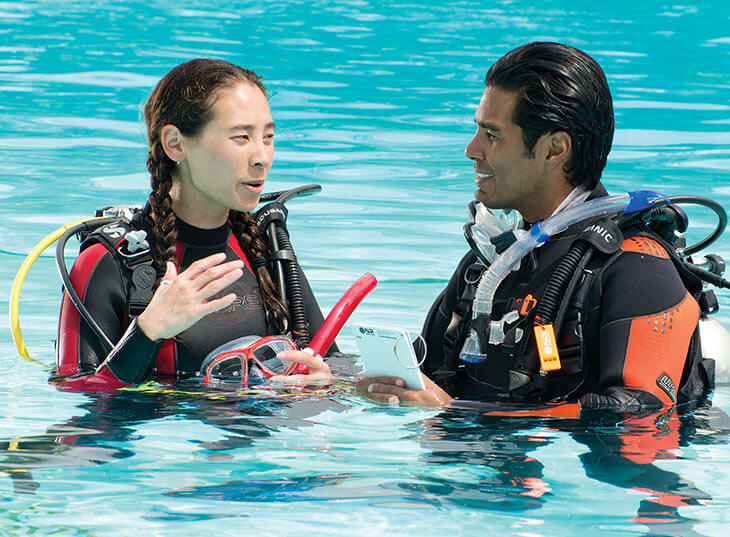
During the course, my instructor gave me some great tips about ear equalization and helped me build confidence in my diving skills. Open communication is key! Scuba instructors love helping people. Whatever problem you’re having, there’s a good chance they’ve encountered it before.
If you’re not ready to enroll in Advanced Open Water, consider joining a local dive club or try a specialty that will help improve your confidence (I recommend Peak Performance Buoyancy or Underwater Navigation).
Like many things in life, the only way to get better at something is to keep doing it. Don’t give up! Keep diving…
